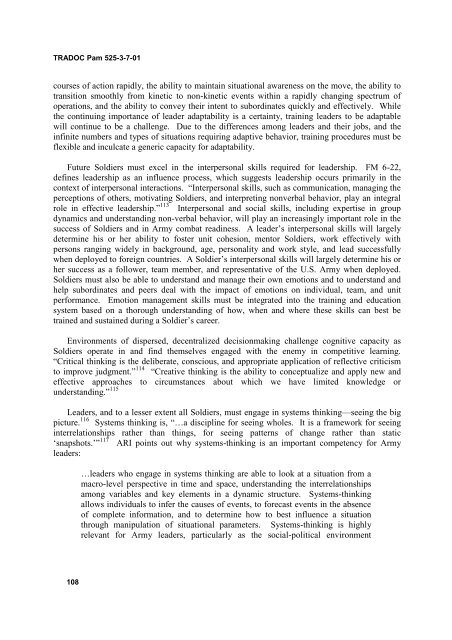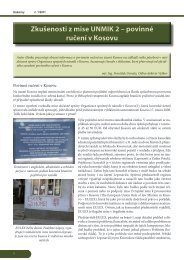TRADOC Pam 525-3-7-01 - TRADOC - U.S. Army
TRADOC Pam 525-3-7-01 - TRADOC - U.S. Army
TRADOC Pam 525-3-7-01 - TRADOC - U.S. Army
- No tags were found...
You also want an ePaper? Increase the reach of your titles
YUMPU automatically turns print PDFs into web optimized ePapers that Google loves.
<strong>TRADOC</strong> <strong>Pam</strong> <strong>525</strong>-3-7-<strong>01</strong>courses of action rapidly, the ability to maintain situational awareness on the move, the ability totransition smoothly from kinetic to non-kinetic events within a rapidly changing spectrum ofoperations, and the ability to convey their intent to subordinates quickly and effectively. Whilethe continuing importance of leader adaptability is a certainty, training leaders to be adaptablewill continue to be a challenge. Due to the differences among leaders and their jobs, and theinfinite numbers and types of situations requiring adaptive behavior, training procedures must beflexible and inculcate a generic capacity for adaptability.Future Soldiers must excel in the interpersonal skills required for leadership. FM 6-22,defines leadership as an influence process, which suggests leadership occurs primarily in thecontext of interpersonal interactions. “Interpersonal skills, such as communication, managing theperceptions of others, motivating Soldiers, and interpreting nonverbal behavior, play an integralrole in effective leadership.” 113 Interpersonal and social skills, including expertise in groupdynamics and understanding non-verbal behavior, will play an increasingly important role in thesuccess of Soldiers and in <strong>Army</strong> combat readiness. A leader’s interpersonal skills will largelydetermine his or her ability to foster unit cohesion, mentor Soldiers, work effectively withpersons ranging widely in background, age, personality and work style, and lead successfullywhen deployed to foreign countries. A Soldier’s interpersonal skills will largely determine his orher success as a follower, team member, and representative of the U.S. <strong>Army</strong> when deployed.Soldiers must also be able to understand and manage their own emotions and to understand andhelp subordinates and peers deal with the impact of emotions on individual, team, and unitperformance. Emotion management skills must be integrated into the training and educationsystem based on a thorough understanding of how, when and where these skills can best betrained and sustained during a Soldier’s career.Environments of dispersed, decentralized decisionmaking challenge cognitive capacity asSoldiers operate in and find themselves engaged with the enemy in competitive learning.“Critical thinking is the deliberate, conscious, and appropriate application of reflective criticismto improve judgment.” 114 “Creative thinking is the ability to conceptualize and apply new andeffective approaches to circumstances about which we have limited knowledge orunderstanding.” 115Leaders, and to a lesser extent all Soldiers, must engage in systems thinking—seeing the bigpicture. 116 Systems thinking is, “…a discipline for seeing wholes. It is a framework for seeinginterrelationships rather than things, for seeing patterns of change rather than static‘snapshots.’” 117 ARI points out why systems-thinking is an important competency for <strong>Army</strong>leaders:…leaders who engage in systems thinking are able to look at a situation from amacro-level perspective in time and space, understanding the interrelationshipsamong variables and key elements in a dynamic structure. Systems-thinkingallows individuals to infer the causes of events, to forecast events in the absenceof complete information, and to determine how to best influence a situationthrough manipulation of situational parameters. Systems-thinking is highlyrelevant for <strong>Army</strong> leaders, particularly as the social-political environment108



